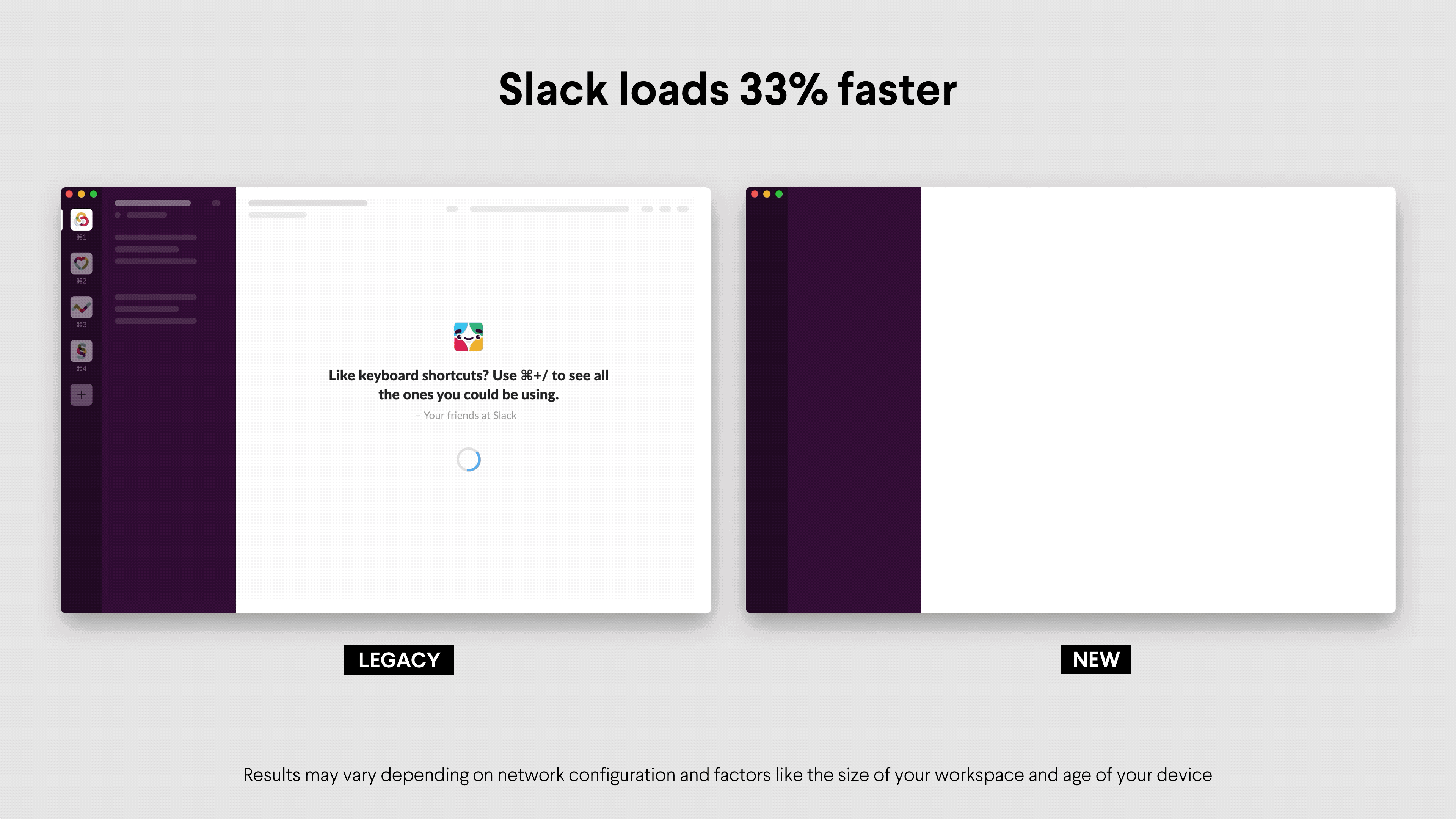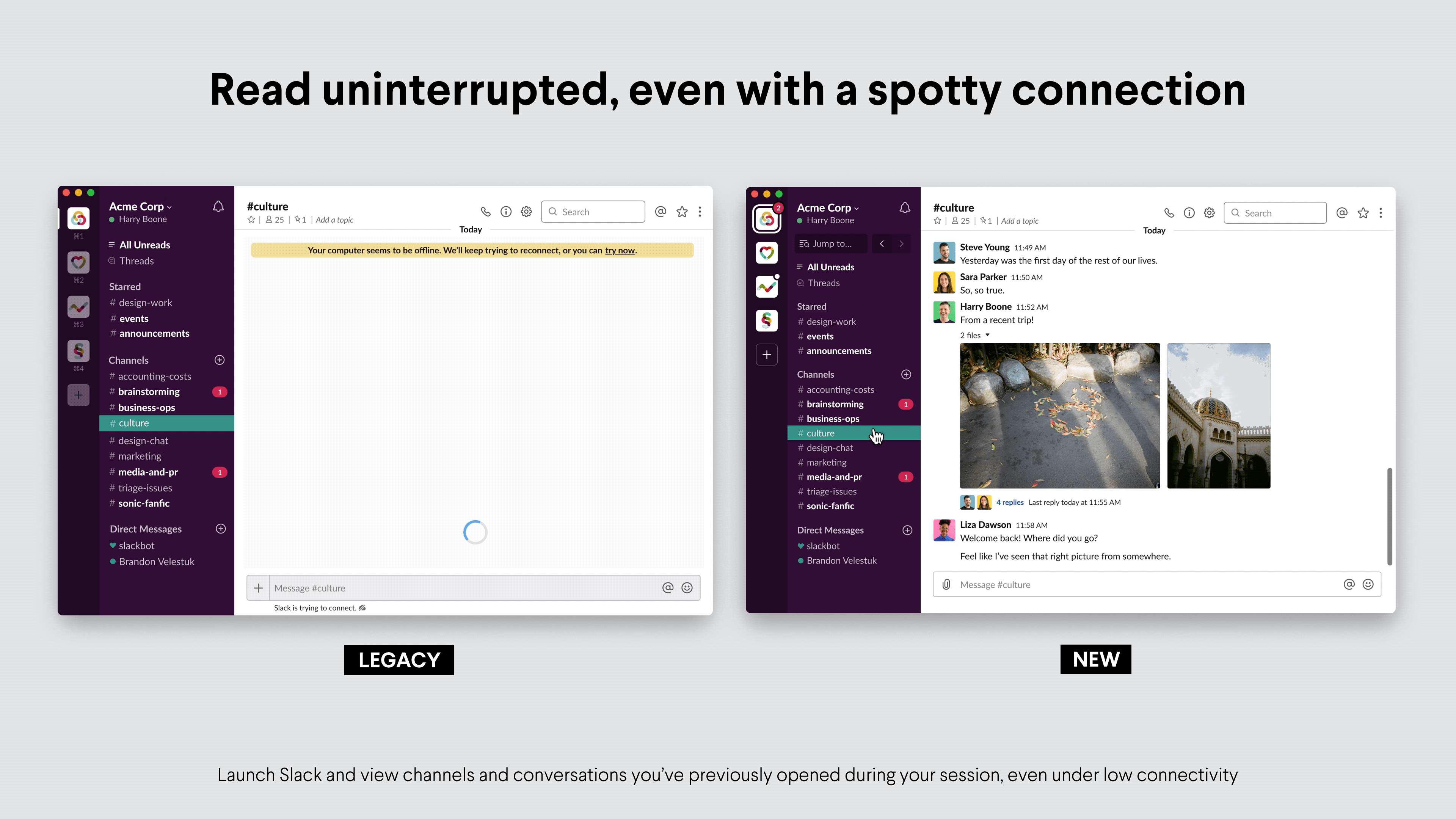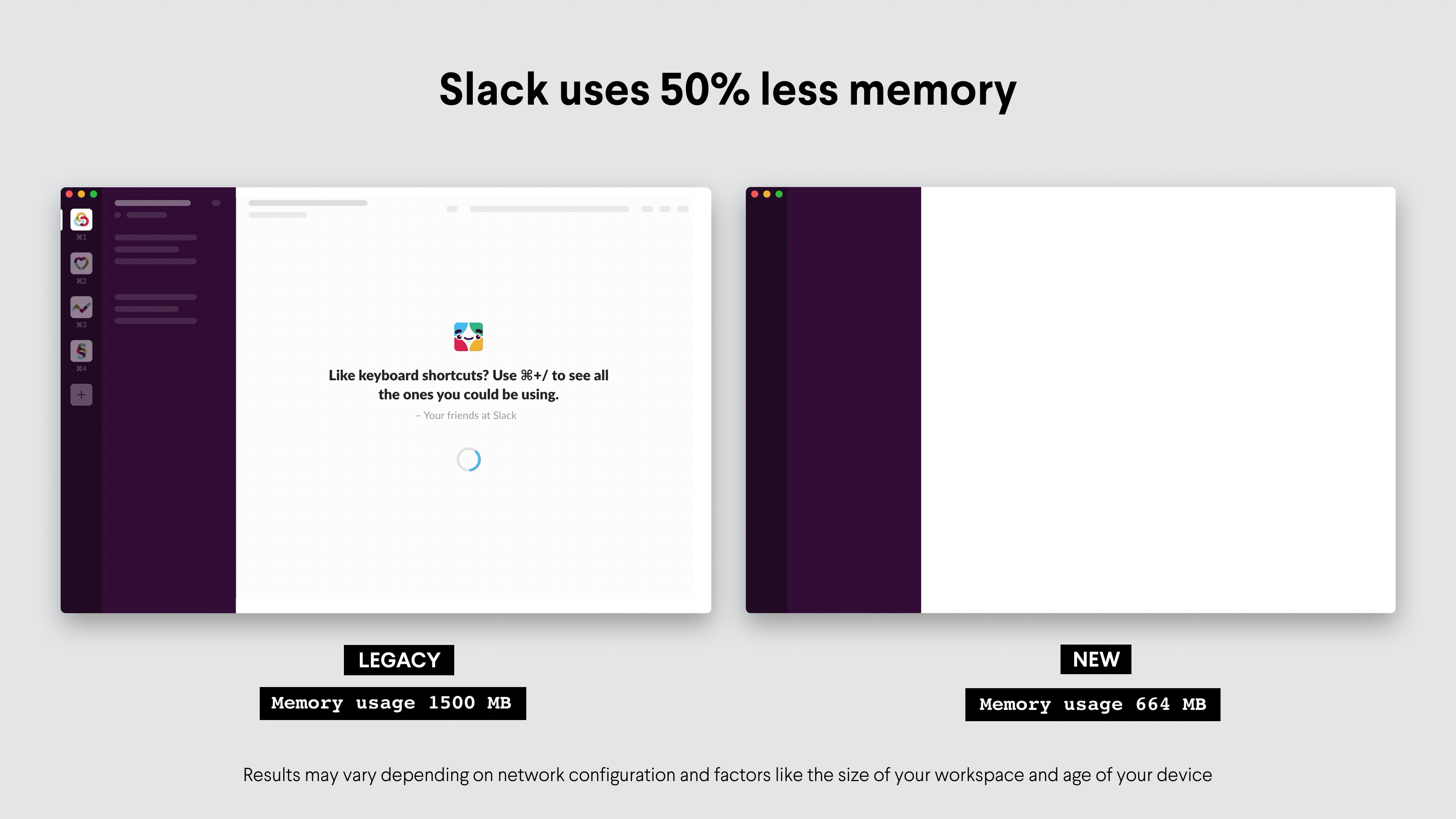Slack speeds up its web and desktop client
Slack is launching a major update to its web and desktop today that doesn’t introduce any new features or a new user interface. Instead, it’s almost a complete rebuild of the underlying technology that makes these two experiences work. Over the course of the last year or so, Slack worked on shifting the web and desktop clients (which essentially use the same codebase) to a modern stack and away from jQuery and other technologies it used when it first introduced these tools in 2012.
“We want people to be able to run Slack alongside anything else they’re using to get their job done and have that be easy, uncumbersome, delightful even. So we took a look at the environment we’re in,” Jaime DeLanghe, director of Product Management at Slack, told me. “I think the other thing to note is that the ecosystem for client-side development has just changed a lot in the past five years. There have been some major updates to JavaScript and new technologies like React and Redux to make it easier to build dynamic web applications. We also wanted to update our stack to fit in with the modern paradigm.”
Over the course of the last few months, the team actually quietly rolled out a lot of the prep work for this move, though the full extent of the work is only going to become apparent once you update the client to the latest version, as it’s the new Electron app that will bring it all together.
Slack promises that this new version will use up to 50% less memory than before and that Slack will load 33% faster. Joining an incoming call will also be 10 times faster now.
A lot of these changes will be especially apparent to users who are part of multiple workspaces. That’s because, as DeLanghe stressed, the team designed the new architecture with the assumption that many users are now part of multiple workspaces. Those used to take up a lot of memory and CPU cycles when you switched between them, as each workspace used to get its own Electron process in the old app. 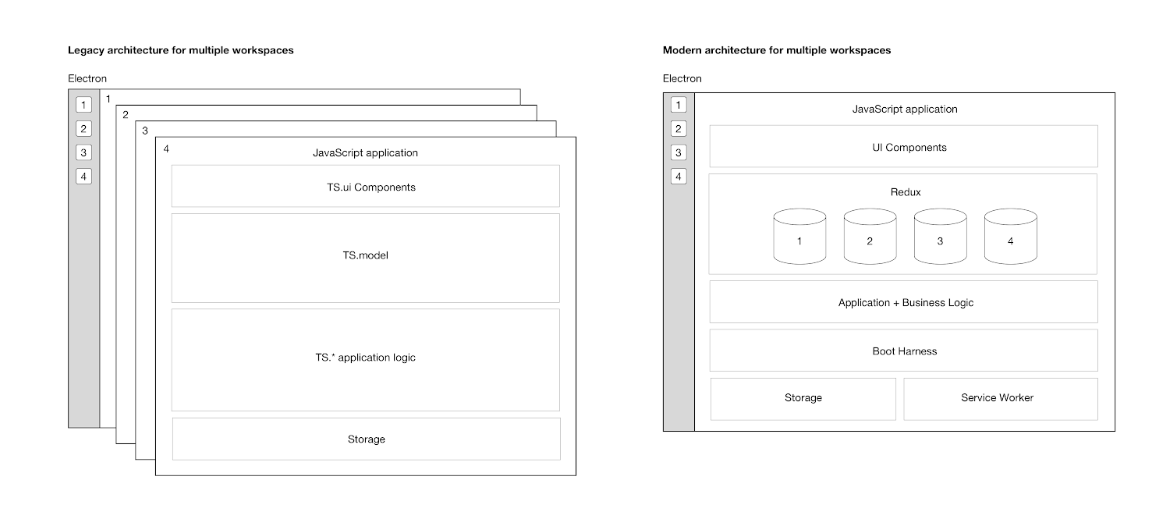
In the updated app, Slack went with React to build all of the UI components, and instead of waiting for all the data to load before displaying the UI, the new app now lazily loads data as it becomes available.
The result of this is an experience that also now allows you to at least read previously opened channels and conversations when you are offline.
What’s maybe even more important, though, is that Slack now has a modern client to build on, which should speed up feature development going forward. “I’m not going to over-promise,” DeLanghe said. “This removes one of the barriers that any company that’s scaling and building features at the same time has to think about. […] This makes that trade-off a little bit easier.”
The update will roll out to all users over the course of the next few weeks. That’s because this is a two-part change. You’ll need both the new desktop application and become eligible for the new version. Some of this is out of Slack’s hands, as your IT department may decide how it rolls out updates, for example.
Powered by WPeMatico
Startups Weekly: The opportunities & challenges for mental health tech
Hello and welcome back to Startups Weekly, a weekend newsletter that dives into the week’s noteworthy startups and venture capital news. Before I jump into today’s topic, let’s catch up a bit. Last week, I wrote about Zoom and Superhuman’s PR disasters. Before that, I noted the big uptick in VC spending in 2019.
Remember, you can send me tips, suggestions and feedback to kate.clark@techcrunch.com or on Twitter @KateClarkTweets. If you don’t subscribe to Startups Weekly yet, you can do that here.

Now let’s talk about mental health startups. VCs may be confident in the potential of teletherapy, but struggling companies in the space tell another story.
Nine months ago Basis launched a website and app for guided conversations via chat or video with pseudo-therapists or people trained in research-backed approaches but who lack the same certifications as a counseling or clinical psychologist. I wrote a story noting that the company, led by former Uber VP Andrew Chapin, had raised a $3.75 million round from Bedrock, Wave Capital and Lightspeed Venture Partners.
But last month, things took a turn for the worse. Basis quietly shut down its website and app, its co-founder and chief science officer, Lindsay Trent, a former research psychologist at Stanford, exited and a good chunk of eight-person team went out the door.
Basis was one of many startups to benefit from VCs’ growing appetite for innovative businesses in the mental health sector. As the stigma associated with seeking mental health support has dwindled and technology developments have allowed for personalized mental health tools and practices, more entrepreneurs have entered the space. Basis, despite having many of the ingredients needed for startup success, couldn’t achieve success with its direct-to-consumer approach to therapy.
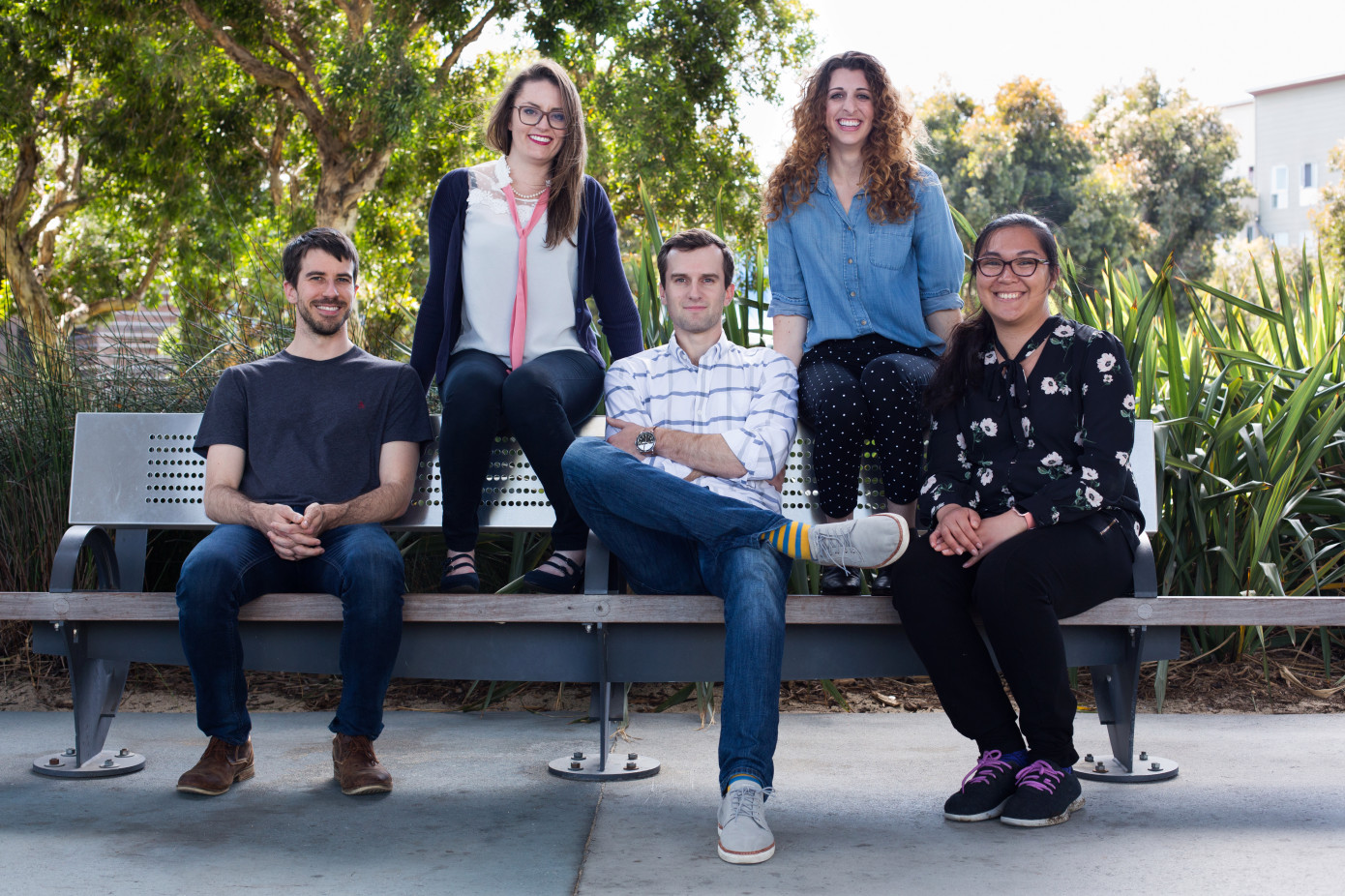
Basis co-founder and CEO Andrew Chapin (center) with the founding team last year
When asked why the Basis app and website were no longer active, Chapin said the company is in the process of “shifting business models.” He declined to provide further details. Lightspeed declined to comment. Wave Capital and Bedrock did not respond to requests for comment.
Basis, which did not claim to treat diagnosable conditions like bipolar disorder or schizophrenia, charged $35 per 45-minute phone call with its paraprofessionals. Its use of unlicensed therapists sparked concern in the mental health provider community. Harley Therapy founder Sheri Jacobson, an accredited counselor and psychotherapist, noted flaws with the service: “For me, replacing professional therapists and all of their lived experience and empathy with telepsychiatry administered by novice advisers could be potentially dangerous,” Jacobson said in a statement. “Would you let a learner driver navigate an oil tanker?”
What could go wrong?
“Because Basis works with paraprofessionals — people trained in research-backed approaches but who don’t have the same certifications as a counseling or clinical psychologist — it’s a much cheaper alternative to paying for a therapist.”
— Christina Farr (@chrissyfarr) October 4, 2018
Consumer mental health startups continue to attract capital from private market investors. Workplace mental health service Unmind, Blackthorn Therapeutics (a neurobehavioral health company using machine learning to create personalized medicine for mental health) and Talkspace (a leader in the online counseling space) have all closed funding rounds in 2019.
Whether Basis will find its footing is TBD. What’s clear is VCs are still willing to dole out checks as they experiment with the mental health space, but if startups don’t start proving viable business models and learn to navigate the complex adoption curve, we’ll see additional startups cease operations and mental health tech’s moment in the sun will end all too soon.
Now for a quick look at the top VC and startup news of the week:
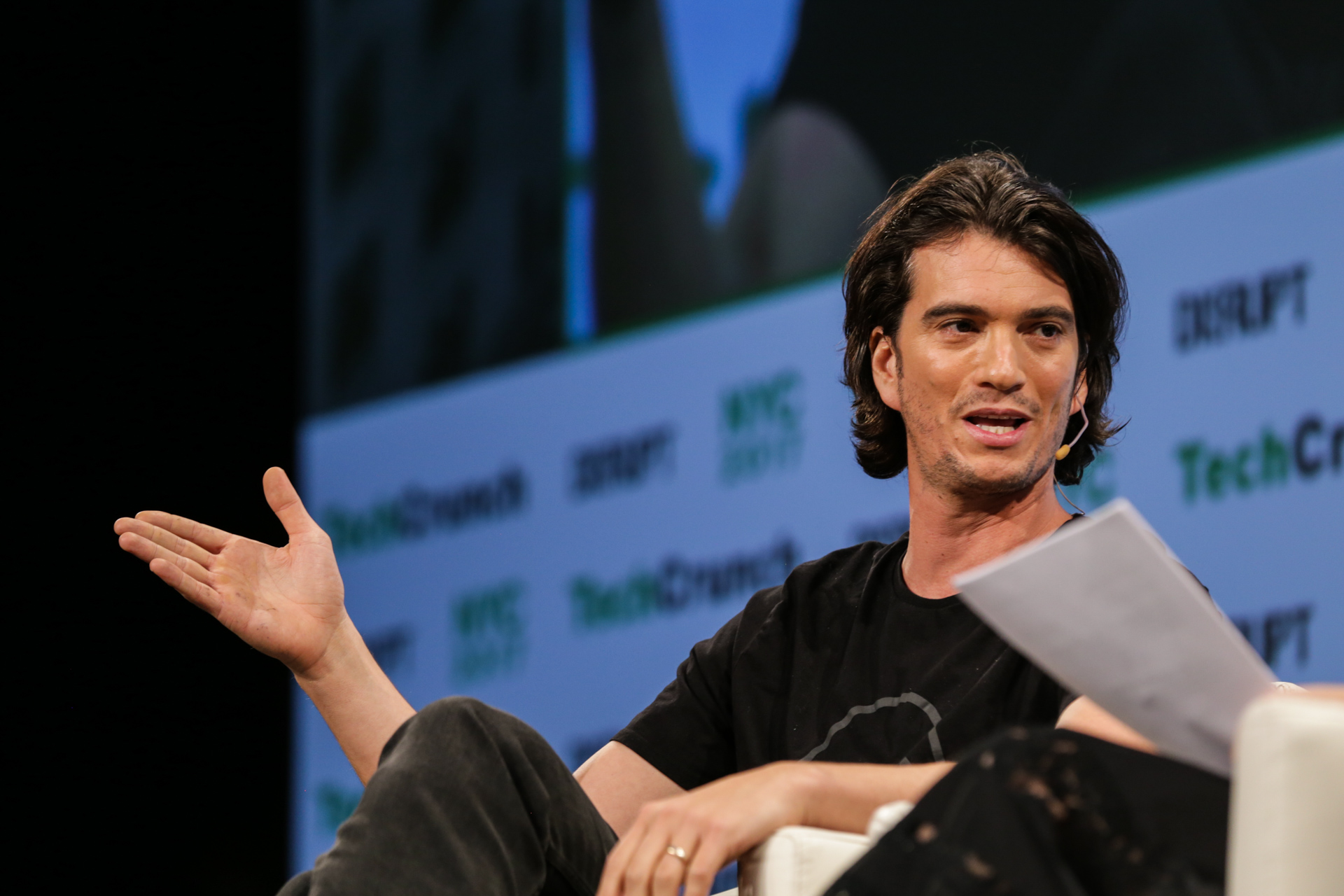
Adam Neumann (WeWork) at TechCrunch Disrupt NY 2017
The eccentric co-founder and CEO of the international real estate co-working startup WeWork has reportedly cashed out of more than $700 million from his company ahead of its upcoming IPO. According to Axios, a majority of that capital came in the form of loans while the remaining $300 million came from stock sales. The size and timing of the payouts is unusual, considering that founders typically wait until after a company holds its public offering to liquidate their holdings. But even with the big sale, Neumann remains the single largest shareholder in WeWork.
The customer experience management platform priced shares of its stock at $21 apiece Thursday, closing up Friday a whopping 76%. Money left on the table? I think so, and I bet Bill Gurley does too. The nearly two-decades-old company sold a total of 15.5 million shares in its IPO, raising $326 million at a $2.5 billion valuation in the process. Medallia’s $268 million in VC funding came from Sequoia Capital — which owned a roughly 40% pre-IPO stake — Saints Capital, TriplePoint Venture Growth and Grotmol Solutions.
The stock was dramatically mispriced by an archaic hand allocated matching process that needs to go away. This is 2019 and everyone intelligent knows there is a better way to match supply and demand. These are failures.
— Bill Gurley (@bgurley) June 29, 2019
Uber finally sets diversity and inclusion goals
Within the next three years, Uber aims to increase the percentage of women at levels L5 and higher (manager and above) to 35% and increase the percentage of underrepresented employees at levels L4 and higher to 14%. Currently, Uber is 9.3% black and 8.3% Latinx compared to just 8.1% black and 6.1% Latinx last year. Uber’s tech team, however, is just 3.6% black, 4.4% Latinx and 2.7% multi-racial. Unsurprisingly, there’s little representation of black and brown people in leadership roles. While Uber CEO Dara Khosrowshahi commented that he’s proud the promotion rates for women have improved over the last couple of years, he added, “I can’t yet say the same for promotions for people of color.”
Email platforms and productivity apps and subscription tools, oh my!
Startups focused on improving productivity and email are unstoppable this year. The latest to close VC rounds are Substack and Notion. Andreessen Horowitz is betting that there’s still a big opportunity in newsletters, leading a $15.3 million Series A in Substack. The company, which consists of just three employees working out of a living room, says that newsletters on the platform have now amassed a total of 50,000 paying subscribers (up from 25,000 in October) and that the most popular Substack authors are already making hundreds of thousands of dollars per year. As for Notion, The Information reported this week that it raised $10 million at an $800 million valuation. Notion is a note-taking and task management app that hasn’t sought much VC funding and, as a result, VCs have been desperately knocking at its door.
Other notable funding events of the week:
- India’s Oyo valued at $10B after founder buys back shares
- Car-sharing marketplace Turo gets $250M at $1B valuation
- Banking startup N26 raises another $170M at $3.5B valuation
- Patreon secures $60M Series D, targets international growth and customization
- Business travel SaaS startup TravelPerk nabs $60M
- Esports company 100 Thieves raises $35M Series B
- Serena Williams, Marc Cuban back Mahmee, a network for new moms
Silicon Valley has many dreams. One dream — the Hollywood version anyway — is for a down-and-out founder to begin tinkering and coding in their proverbial garage, eventually building a product that is loved by humans the world over and becoming a startup billionaire in the process. But when it comes to that Silicon Valley dream of a nice house from a decent return on exit, it’s getting narrower and less widely distributed. Blitzscaling is making a lot of people a lot of wealth, but early employees? Not so much.
Read more from TechCrunch editor Danny Crichton.
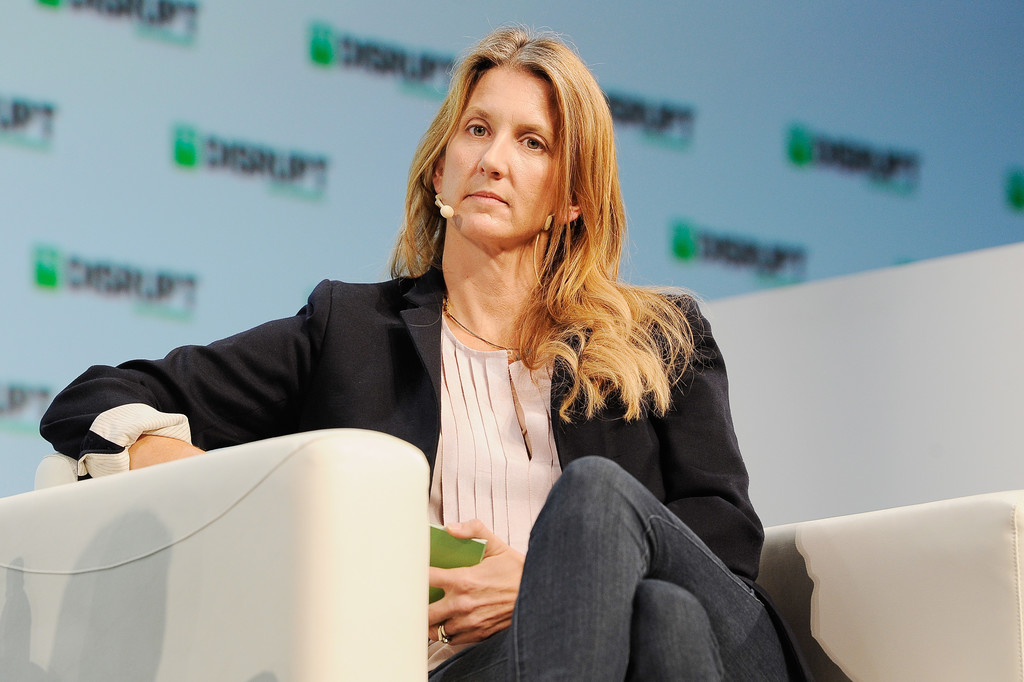
TechCrunch’s senior transportation reporter Kirsten Korosec.
TechCrunch senior transportation reporter Kirsten Korosec has something great in the works. All of us here at TechCrunch are very excited to announce The Station, a new TechCrunch newsletter all about mobility. Each week, in addition to curating the biggest transportation news, Kirsten will provide analysis, original reporting and insider tips on the fast-growing industry. Sign up here to get The Station in your inbox beginning in August.
While we’re on the subject of amazing TechCrunch #content, it’s probably time for a reminder for all of you to sign up for Extra Crunch. For a low price, you can learn more about the startups and venture capital ecosystem through exclusive deep dives, Q&As, newsletters, resources and recommendations and fundamental startup how-to guides. Here are some of my personal favorite EC posts from the past week:
- The Roblox EC-1, Part 1: The Origin Story // How Roblox avoided the gaming graveyard and grew into a $2.5B company by Sherwood Morrison.
- What seed-stage dilution tells us about changing investor expectations // A little-noticed startup financing trend has big implications for how VC firms evaluate companies raising Series A and B rounds by Dale Chang.
- Which types of startups are most often profitable? // One answer: E-commerce, Chrome extensions, mobile apps, enterprise SaaS, SMB SaaS — in that order by Julian Shapiro.
If you enjoy this newsletter, be sure to check out TechCrunch’s venture-focused podcast, Equity. In this week’s episode, available here, Equity co-host Alex Wilhelm and I debate Forbes’ latest next billion-dollar startups list.
Extra Crunch subscribers can read a transcript of each week’s episode every Saturday. Read last week’s episode here and learn more about Extra Crunch here. Equity drops every Friday at 6:00 am PT, so subscribe to us on Apple Podcasts, Overcast, Pocket Casts, Downcast and all the casts.
That’s all, folks.
Powered by WPeMatico
WeWork CEO Adam Neumann has reportedly cashed out of over $700 million ahead of its IPO
Adam Neumann, the co-founder and chief executive of the international real estate co-working startup WeWork has reportedly cashed out of more than $700 million from his company ahead of its initial public offering.
The size and timing of the payouts, made through a mix of stock sales and loans secured by his equity in the company, is unusual, considering that founders typically wait until after a company holds its public offering to liquidate their holdings.
Despite the loans and sales of stock, first reported by The Wall Street Journal, Neumann remains the single largest shareholder in the company.
According to the Journal’s reporting, Neumann has already set up a family office to invest the proceeds and begun to hire financial professionals to run it.
He’s also made significant investments in real estate in New York and San Francisco, including four homes in the greater New York metropolitan area, and a $21 million, 13,000-square-foot house in the Bay Area, complete with a guitar-shaped room (I guess a fiddle would be too on the nose). In all, Neumann reportedly spent $80 million on real estate.
Neumann has also invested in commercial real estate (the kind that WeWork leases to provide work space with more flexible leases for companies and entrepreneurs), including properties in San Jose, Calif. and New York. Indeed, four of Neumann’s properties are leased to WeWork — to the tune of several million dollars in rent. According to the Journal, Neumann will transfer those property holdings to a WeWork-controlled fund.
The WeWork chief executive has also invested in startups in recent years. He’s got an equity stake in seven companies: Hometalk, Intercure, EquityBee, Selina, Tunity, Feature.fm and Pins, according to CrunchBase.
The rewards that Neumann is reaping from the loans and stock sales are among the highest recorded by a private company executive. In recent years, Evan Spiegel sold $8 million in stock and borrowed $20 million from Snap before its 2017 public offering, and Slack Technologies chief executive Stewart Butterfield sold $3.2 million of stock before Slack’s public offering in June.
The only liquidation of stock and other payouts that have been disclosed that come close to Neumann’s payouts are the $300 million that Groupn co-founder Eric Lefkofsky sold before his company’s IPO and the over $100 million that Mark Pincus took off the table ahead of Zynga’s offering.
WeWork declined to comment for this article.
Powered by WPeMatico
Medallia stock up 76% following first day trading on the NYSE
Customer experience management platform Medallia (NYSE: MDLA) rose more than 70% in its New York Stock Exchange debut Friday.
The nearly two-decades-old business priced its shares at $21 apiece, the top of its proposed range, Thursday evening and traded as high as $39.54 the following morning. Medallia closed up roughly 76% at about $37 per share on Friday.
Medallia sold a total of 15.5 million shares in its IPO, raising $326 million at a $2.5 billion valuation in the process.
San Mateo-headquartered Medallia, led by chief executive officer Leslie Stretch, operates a platform meant to help businesses better provide for their customers. Its core product, the Medallia Experience Cloud, provides employees real-time data on customers collected from online review sites and social media. The service leverages that data to provide insights and tools to improve customer experiences.
The company is backed by four venture capital firms: Sequoia Capital — which owned a roughly 40% pre-IPO stake — Saints Capital, TriplePoint Venture Growth and Grotmol Solutions, the latter which invested a small amount of capital in 2010. Medallia has raised a total of $268 million in equity funding, including a $70 million Series F funding earlier this year.
Sequoia’s 40% stake was worth upwards of $1.8 billion at Medallia’s high price Friday.
Powered by WPeMatico
Deadline extended! Apply to the All Raise female founder program at Disrupt SF 2019
We’ve got great news for all the time-strapped female founders out there. Yeah, we’re looking at you, sister. We’re extending the application deadline to apply for the All Raise “ask me anything” (AMA) sessions at Disrupt SF 2019. Don’t miss this rare opportunity to meet with a leading female VC and, well, ask her anything. Apply for an AMA session by August 15.
Not familiar with All Raise? This startup nonprofit, dedicated to accelerating female founder success, will host a day-long AMA event on October 3 at Disrupt SF 2019 — in a dedicated section of Startup Alley. Each AMA session lasts 30 minutes and consists of three founders and one VC. All Raise expects more than 100 female founders to take part in at least 30 sessions scheduled throughout the day.
Don’t bring your pitches, bring your questions — the kind of questions that keep you up at night. It’s a rare opportunity to ask a leading VC advice on topics like your next raise, key hires, your competition. Imagine receiving business advice from any of these female VCs:
- Dayna Grayson, NEA
- Susan Lyne, BBG
- Shauntel Garvey, Reach Capital
- Eurie Kim, Forerunner
- Jess Lee, Sequoia
- Kara Nortman, Upfront
- Sara Guo, Greylock,
- Anarghya Vardhana, Maveron
- Eva Ho, Fika Ventures
- Sarah Smith, Bain Capital Ventures
- Jess Lin, Work-Bench
You can apply for an All Raise AMA session if you’re a U.S.-based woman founder and you’ve raised at least $250,000 in a seed, A or B round. All Raise gives special consideration to founders from underrepresented groups (e.g. Black, Latinx or LGBTQIA women).
All Raise will review the applications and notify the founders. Acceptance is based on availability for session spots, investor fit with industry sector and company stage, as well as demand for certain categories.
If you’re selected, your next step is to buy any pass to Disrupt SF (including Expo Only). All Raise will send an email to let you know what time they’ve scheduled your session.
Networking opportunities of this caliber don’t come along very often — especially for women in tech. Build connections, learn from expert female VCs and move your startup forward. Take advantage of the deadline extension and apply for an AMA session before August 15. We want to see you in San Francisco!
If you are interested in sponsoring this event or exhibiting at Disrupt San Francisco 2019, fill out this form to get in contact with our sales team.
Powered by WPeMatico
India’s Oyo valued at $10B after founder purchases $2B in shares
The fast-growing Indian hospitality business Oyo has garnered a valuation of $10 billion after its founder, Ritesh Agarwal, purchased $2 billion in shares from venture capital firms Sequoia Capital and Lightspeed Venture Partners, the company announced Friday.
Agarwal, 25, founded Oyo in 2013 at the age of 19. Following immense growth of the now global hotel chain business, Agarwal opted to increase his 10% stake to 30% via a Cayman Islands company called RA Hospitality Holdings, according to The Wall Street Journal. SoftBank has also increased its percent ownership as part of this round, now owning nearly half of the company.
Oyo has raised a whopping $1.6 billion in equity funding to date, reaching a valuation of $5 billion at its last funding round. Other investors in the company include Airbnb, Grab Holdings and Didi Chuxing.
Oyo is active in 800 cities in 80 countries, with more than 23,000 hotels in its portfolio. Recently, the company announced plans to invest $300 million in the U.S. market, where it currently operates more than 50 Oyo Hotels in 35 cities and 10 states.
Earlier this week, the Gurgaon-headquartered firm introduced Oyo Workspaces. The new entity was born out of its acquisition of Innov8, a co-working startup with more than 200 employees. The four-year-old startup was acquired for about $30 million, according to reporting by TechCrunch’s Manish Singh.
Powered by WPeMatico
Self-driving startup AutoX expands beyond deliveries and sets its sights on Europe
AutoX, the Hong Kong and San Jose, Calif.-based autonomous vehicle technology company, is pushing past its grocery delivery roots and into the AV supplier and robotaxi business.
And now, it’s taking its business to Europe.
AutoX has partnered with NEVS — the Swedish holding company and electric vehicle manufacturer that bought Saab’s assets out of bankruptcy — to deploy a robotaxi pilot service in Europe by the end of 2020. Under the exclusive partnership, AutoX will integrate its autonomous drive technology into a next-generation electric vehicle inspired by NEVS’s “InMotion” concept that was shown at CES Asia in 2017.
This next-generation vehicle is being developed by NEVS in Trollhättan, Sweden. Testing of the autonomous NEVs vehicles will begin in the third quarter of 2019. The vehicles will hit public roads in Europe next year, the companies said.
AutoX founder and CEO Jianxiong Xiao, commonly referred to as Professor X, noted that this particular vehicle is ideal for an autonomous taxi service because it is purpose-built for this specific application, doesn’t produce tailpipe emissions, can be used 24 hours a day and can help reduce the number of vehicles in the streets.
The companies ultimately want to deploy a large fleet of robotaxis globally.
The partnership with NEVs is the latest sign that AutoX has broader ambitions for its autonomous vehicle technology than delivery services. AutoX launched in 2016 and was initially focused on using self-driving vehicles for delivering packages, namely groceries. Last August, the startup kicked off a grocery delivery and mobile store pilot in a limited area in San Jose in partnership with GrubMarket.com and local high-end grocery store DeMartini Orchard.
But more recently, the company, which has raised about $58 million from venture and strategic investors, has expanded its plans. The company now wants to supply manufacturers with autonomous vehicle technology and launch its own robotaxi service.
In June, AutoX became the second company to receive permission from California regulators to transport passengers in its robotaxis. AutoX is calling its California robotaxi service xTaxi.
The California Public Utilities Commission has also granted Pony.ai, Waymo and Zoox permits to participate in the state’s Autonomous Vehicle Passenger Service pilot, which prohibits the companies from charging for these robotaxi rides.
Professor X has previously said his mission is to open up autonomous vehicles to everyone, and so this expansion shouldn’t come as a surprise. It’s a goal the company contends can be reached using economical (and better) hardware. The company does use light detection and ranging radar, known as lidar. But instead of loading up its self-driving vehicles with numerous expensive lidar units, AutoX relies more on cameras, which it argues have better resolution. The company’s proprietary AI algorithms tie everything together.
For now, the xTaxi pilot in California will be rather limited. It will operate in the same operational design domain as the delivery service in San Jose, an area of about five square miles. But the company clearly has ambitions to expand both in size and geographic reach. AutoX has more than 115 employees, and plans to hire more than 50 people this year.
The company is also working with San Jose city government to launch another pilot downtown. It has yet to reveal details, although the pilot could launch as early as next month.
AutoX also has a permit to operate a robotaxi service in Shenzhen, China. It’s not clear whether the company will operate this service on its own or follow the model it set in Europe with NEVS. It’s possible AutoX will partner with BYD in China. AutoX is already working with the Chinese company to integrate its AV tech into BYD vehicles.
Powered by WPeMatico
How to go to market in middle America
There comes a time for many startup companies where they either realize they need to do a nationwide rollout, or they need to actively target buyers in the middle of the country. If you are a startup on either the East or the West Coasts, it’s worth thinking about how this market might present its own set of unique challenges, and how you plan to overcome them.
There are a lot of misconceptions about what some people call “flyover country,” and as a San Francisco native who spent two decades in New York, Washington DC, and Boston before moving to Pittsburgh, I can assure you they are almost all wrong. Without getting into specifics, the reality of “middle America” is that it’s the same as anywhere else.
Income, education, world view, and waistlines are all varied. It’s pretty accurate that San Francisco possesses a culture obsessed with fitness and entrepreneurship, but California isn’t necessarily all like that, and if you think it is, I encourage you to go to Bakersfield, the Central Valley, or Eureka sometime.
In addition, just because the stereotypes are wrong doesn’t mean there’s nothing different about doing business here. As you think about how to conduct your rollout, here are some things you should consider:
Table of Contents
Research
As with any market, research is key since it informs every other aspect of the rollout. Start by looking into who your competition is.
Since there are fewer VC-backed startups in middle America, and smaller companies tend to get less press, the research may be harder. However, there are some major universities that are actively putting money into their own Entrepreneurship programs and those spinoffs often do very well.
Powered by WPeMatico
Mylk Guys wants to be the online vegan grocery store that non-vegans can love
Gaurav Maken, the chief executive officer of the online vegan grocery store Mylk Guys, doesn’t think of his company as a place to just buy food. For him, it’s a testing ground and platform for all of the new food products he expects to be developed as startup entrepreneurs and established food companies start tackling the plant-based and alternative-meat market in earnest.
The company has raised $2.5 million in support of that vision from investors, including Khosla Ventures, Pear Ventures and Fifty Years.
“Today we’re an online grocery store,” says Maken. “We are also a place for cultured meats and any genetically engineered food that allows us to scale our food production and allows us to keep feeding people.”

Maken isn’t wedded to plant-based products and envisions a virtual store stocked with products that create more sustainable consumption options for its customers. In fact, 40% of the company’s customers are not vegan, according to Maken.
“We don’t only think about vegans. We think about sustainable food systems,” says Maken. “Our audience is an educated consumer who wants to have less of an impact from their diet… They’re just folks trying to do better with their eating habits.”
Right now, the company sells around 1,300 products through its site. And the pitch that Maken makes to suppliers is that they can access the data around their customers (unlike other online retailers, whose name rhymes with shmamazon).
“We provide analytics and a way for brands to unlock the data coming from their customers,” Maken says. “Our focus is how can we get you a personalized staple that works for you.”
The company’s top sellers are vegan cheeses like Sparrow Camembert, lines of vegan jerkies and the Beyond Burger, Maken said.
“You can build brands that are successful that are $1 million brands or $5 million brands and the reason why you haven’t is because they haven’t had the platform to provide national distribution to be successful,” says Maken.
Mylk Guys launched in 2018 and went through the Y Combinator accelerator program. Now, with its new capital, the company is focusing on expanding its sales and marketing on the East Coast, opening a new warehouse for distribution and reaching out to the vegan community on the Eastern Seaboard.
The model for selling more sustainable foods directly to the consumer has at least one precedent. Los Angeles-based Thrive Market raised $111 million in a 2016 round of funding for its online sustainable product-focused grocery store.
As recent reports indicate, the sustainable food business is only growing. Citing reports from Ecovia Intelligence, the publication Environmental Leader reported that organic food sales topped $100 billion for the first time in 2018.
Powered by WPeMatico
Huawei’s new OS is for industrial use, not Android replacement
Seems Hongmeng isn’t the Android replacement it’s been pitched as, after all. The initial story certainly tracked, as Huawei has been preparing for the very real possibility of life after Google, but the Chinese hardware giant says the operating system is primarily focused on industrial use.
The latest report arrives courtesy of Chinese state news agency, Xinhua, which notes that the OS has been in development for far longer than the Trump-led Huawei ban has been in effect. Hongmeng is a relatively simple operating system compared to the likes of Android, according to SVP Catherine Chen. The news echoes another recent report that Huawei had initially developed the software for use on IoT devices.
None of this means that Huawei isn’t working on a full mobile operating system, of course. Or that the seeds of this new OS couldn’t be adapted to do more.
And given the recent news, such a move would be a pretty good use of the company’s vast resources. After all, it’s no doubt seen the writing on the wall for some time. While no one anticipated that such a ban would arrive so suddenly, questions about the company have been floated in security circles for years now.
New restrictions from the Trump administration barred Huawei from working with American companies like Google, but temporary reprieves have allowed the smartphone maker to employ Android services — at least temporarily. Questions about the company’s health are still very much up in the air, however, as the ban ramps back up.
Powered by WPeMatico
